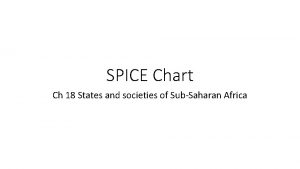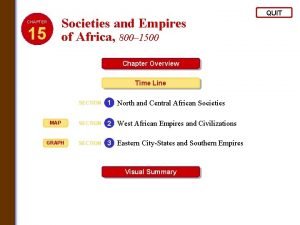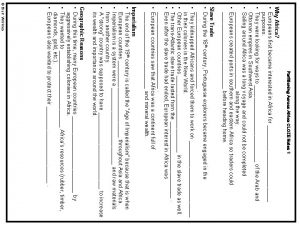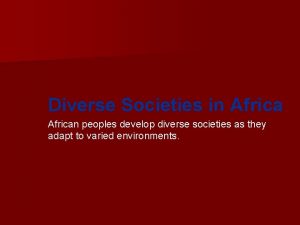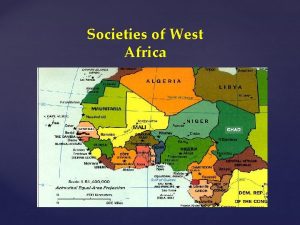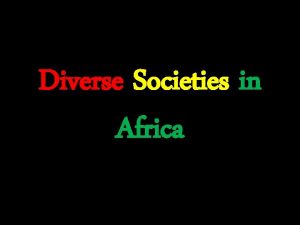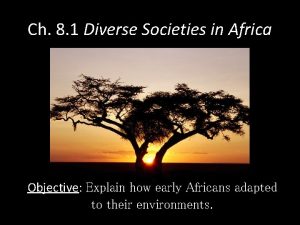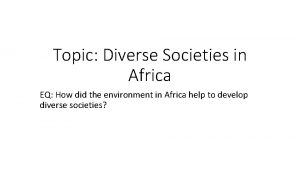Diverse Societies in Africa Introduction Africa spreads across
















- Slides: 16

Diverse Societies in Africa

Introduction • Africa spreads across the equator • It includes a large array of environments • Some parts suffer constant drought while others receive over 200 inches of rainfall a year • Interaction with the environment has created diverse cultures and societies • Each group found different ways to adapt


The Land • Second largest continent in the world • Occupies 1/5 of the earth’s surface • The coastline has few harbors, ports, or inlets • Because of this, its coastline is actually shorter than Europe's

The Environment • Deserts are unsuitable for life • They also hamper peoples movements • The large deserts are the Sahara and the Kalahari • The Sahara is about the size of the US • Only a small part consists of sand dunes, the rest is a wasted area of rocks and gravel • Another difficult area to live in is the rainforest




• The tsetse fly is found in the rainforest • It prevents people from having cattle, donkeys, or horses • It also prevented people from colonizing in Africa • The northern coast and the southern tip of Africa have a good climate and fertile soil • Most people in Africa live in savannas – grassy plains



Early Humans • The earliest Africans were nomadic hunter -gatherers • Other Africans learned to domesticate certain animals • Experts believe that agriculture began in Africa around 6000 BC • Other Africans learned to farm in the rainforest where they planted yams



Early Societies • They all shared common elements • One was that their basic unit was the family • They organized themselves into family groups • They had religions that consisted of animism • They believe that spirits are present in animals, plants, and other forces

 African iron age
African iron age Diverse societies in africa
Diverse societies in africa Diverse diverse
Diverse diverse Mali spice chart
Mali spice chart Chapter 15 societies and empires of africa
Chapter 15 societies and empires of africa African geography cloze notes
African geography cloze notes Partitioning across africa cloze notes
Partitioning across africa cloze notes European partitioning
European partitioning European partitioning across africa
European partitioning across africa Bierocks recipe
Bierocks recipe Chapter 6 section 3 the enlightenment spreads answer key
Chapter 6 section 3 the enlightenment spreads answer key Baroque definition enlightenment
Baroque definition enlightenment Mre cheese spread
Mre cheese spread Chapter 9 section 3 industrialization spreads
Chapter 9 section 3 industrialization spreads Chapter 9 section 3 industrialization spreads
Chapter 9 section 3 industrialization spreads Chapter 9 section 3 industrialization spreads answer key
Chapter 9 section 3 industrialization spreads answer key Expansion diffusion
Expansion diffusion



